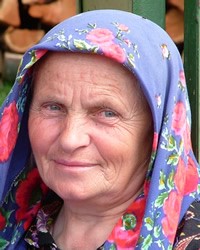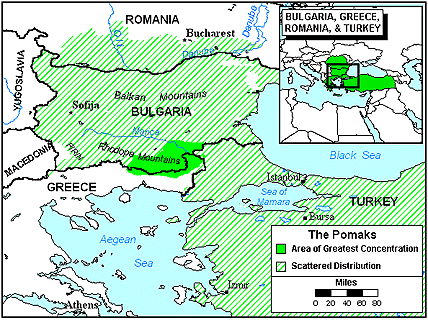The Pomaks are a Slavic people who live in the Balkan region of southern Europe. They are usually considered to be a type of Bulgarian since they speak a Bulgarian dialect, have Bulgarian features, and have cultural practices similar to the Bulgarians. They are distinguished, however, by their non-Bulgarian names and their devotion to Islam, rather than to Orthodox Christianity. The Pomaks probably converted to Islam in the 1370s. Tradition says that they did not voluntarily accept Islam but were forced to do so. As time went by, they gradually began to adopt various Muslim customs, such as the veiling of women.
The name Pomak means "people who have suffered." Throughout history, they have been considered the outcasts of Bulgarian society. In 1948, the Communists began to remove people they thought to be disloyal to their regime. By 1950, the Pomak were the new target. Eventually, 30,000 people were moved across the border into northeast Greece and Macedonia, while others immigrated into Romania.
During the last century, modernization has forced them to come into contact with the outside world. A small number have migrated to Italy, a country that is near Bulgaria.
Pomak people are used to agricultural work. Those who have migrated to Italy must adjust to a more industrial economy and the jobs needed for that kind of environment.
Traditionally, Pomak marriages are arranged between the families of the prospective bride and groom. The wedding occurs when the couple reaches their mid to late teens. Before marriage, the bride prepares her own dowry, which consists of household items and clothing. Although Islamic law allows a man to have as many as four wives, polygamy was never frequent among the Pomaks and is currently prohibited by Greek law.
The Pomaks are virtually all Muslim, and their religion makes up an integral part of their ethnic identity. Yet, among most Pomaks there is an absence of traditional Islamic practices. Their language even lacks many religious words vital to the Islamic faith and traditions. Muslim saints are practically unknown to the Pomaks, while the feast days of various Christian saints continue to be observed.
Weddings and other ceremonial occasions often combine Muslim and Christian traditions. Fasting during Ramadan (the ninth month of the Islamic year) and other Muslim rituals were once observed. However, today, these customs have largely disappeared. The relative isolation of the Pomaks from other Muslims has allowed the mixing of beliefs to continue unhindered for centuries.
The Pomak have an identity crisis. They have been rejected by both the Bulgarians (and their religion), and the Turks (and their language). The Pomaks need the gospel. They also need people who will begin to faithfully intercede for them, tearing down the strongholds that are keeping them in spiritual bondage.
Pray that the Pomaks would find their lost identity in Jesus.
Pray for Christian pastors to be raised up and trained among the Pomaks.
Ask God to give Pomak believers creative ways of witnessing, such as using Christian weddings and holidays.
Pray for student outreach among the Pomaks.
Ask the Lord of the harvest to send forth laborers to work among the Pomaks.
Ask God to create a hunger within the hearts of the Pomaks to know the Truth.
Pray that God will give the small number of Pomak believers boldness to share Christ with their own people.
Ask God to raise up teams of intercessors who will faithfully stand in the gap for the Pomaks.
Ask the Lord to bring forth vigorous churches among the Pomaks for the glory of His name!
Scripture Prayers for the Pomak in Italy.
https://en.wikipedia.org/wiki/Pomaks
| Profile Source: Joshua Project |












